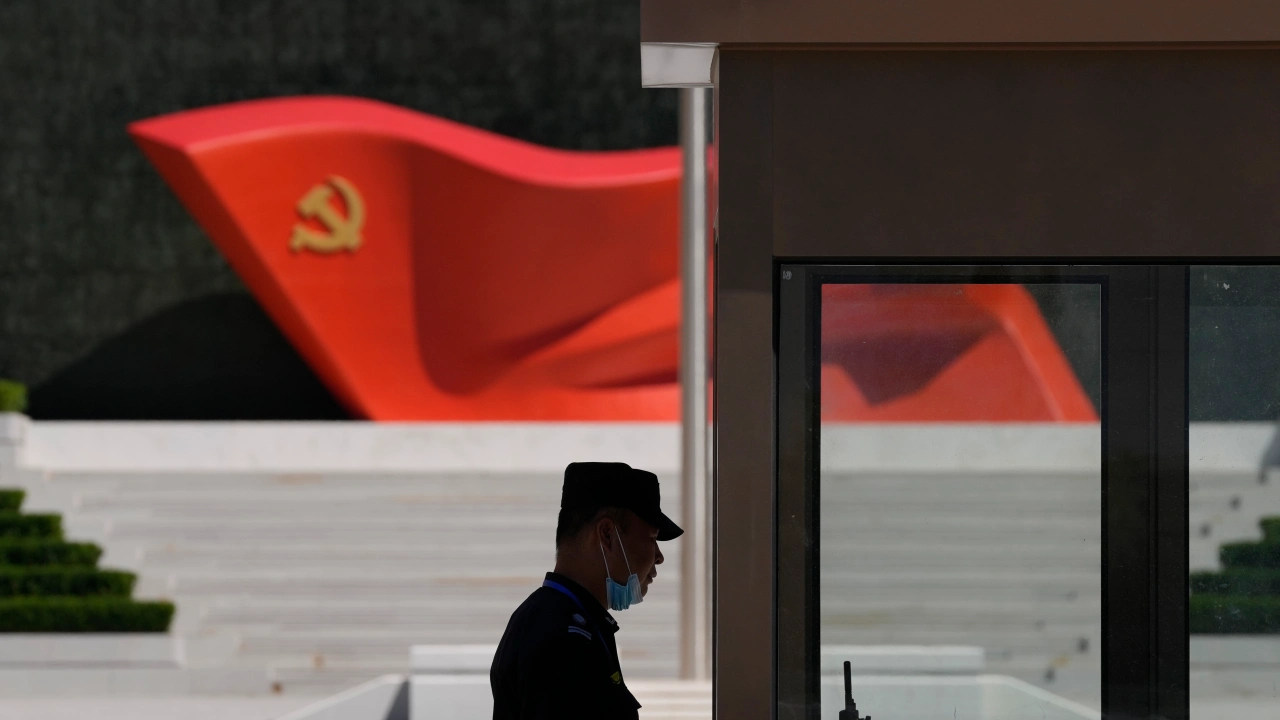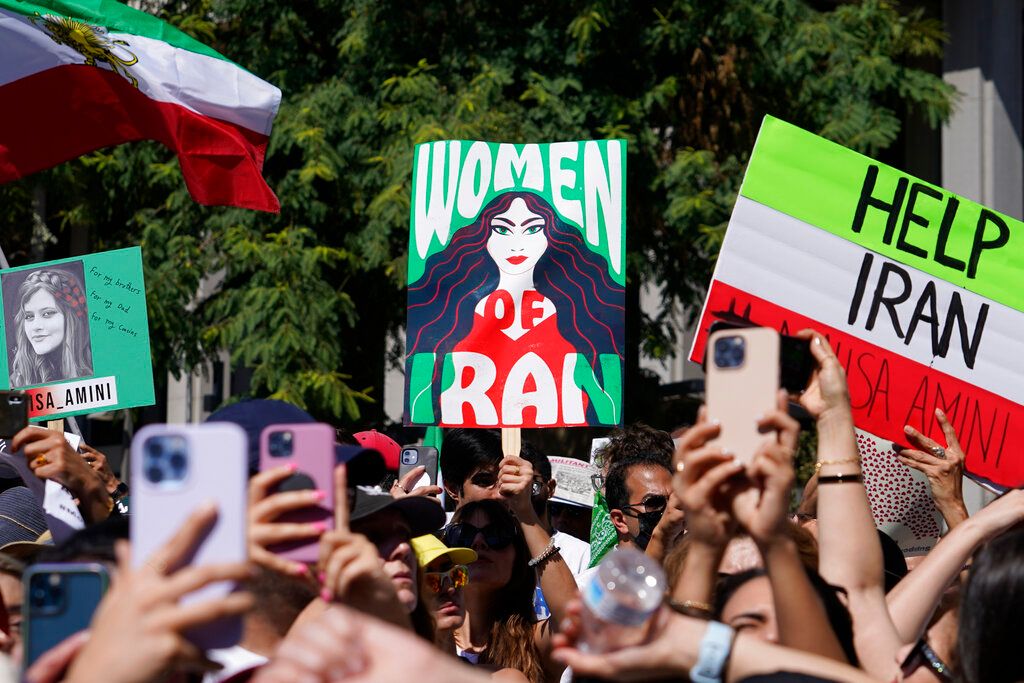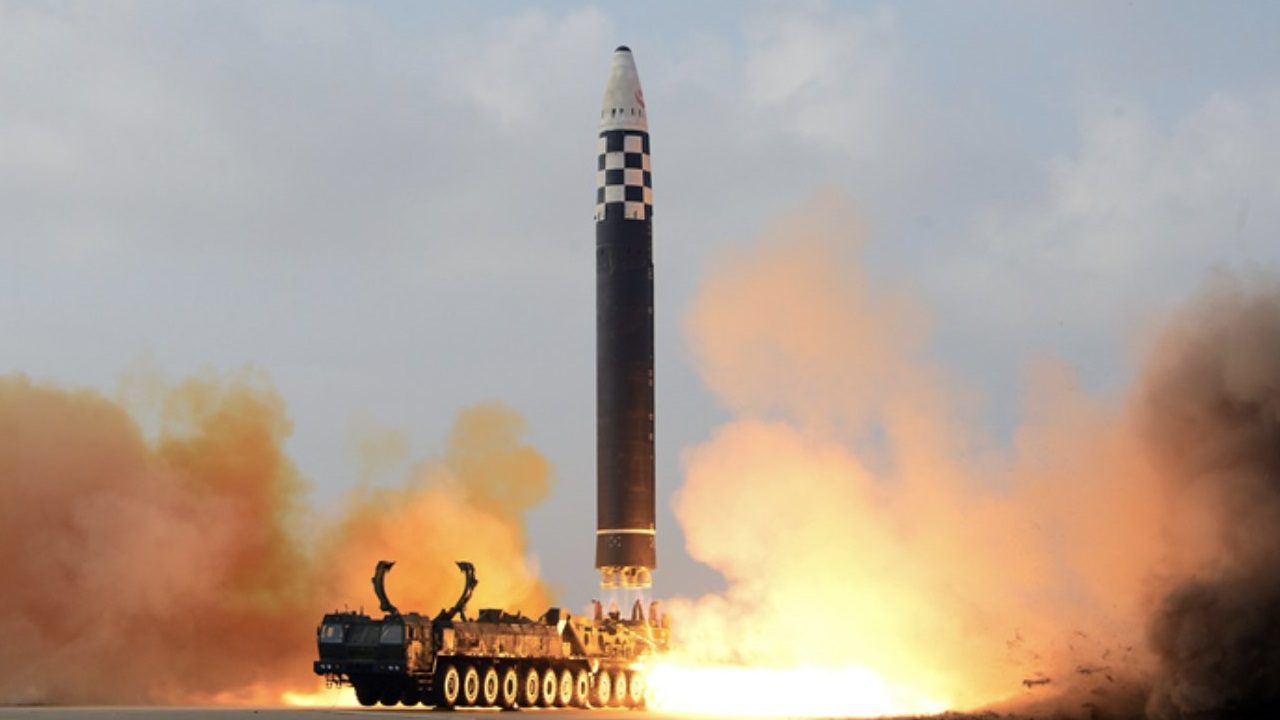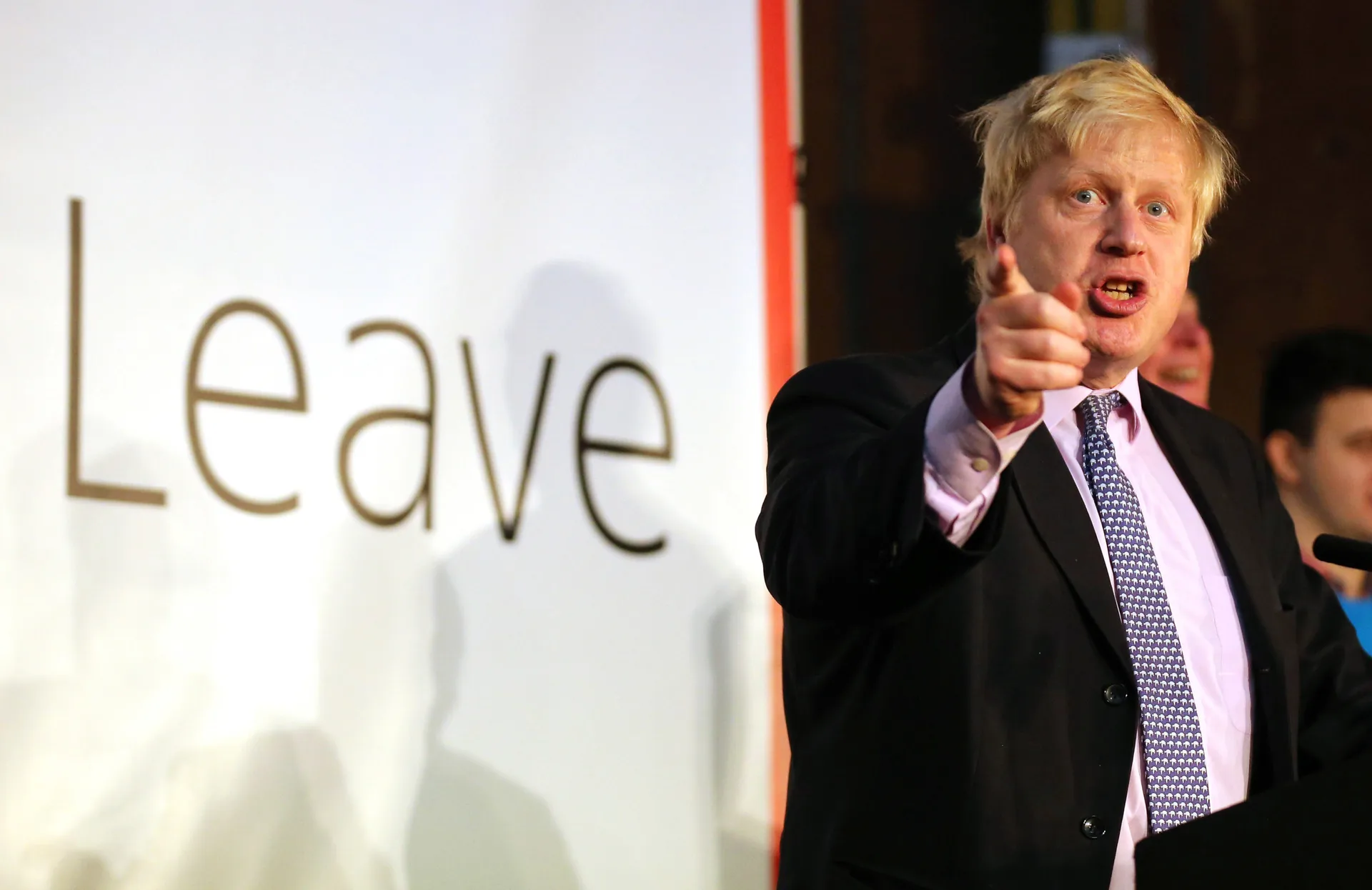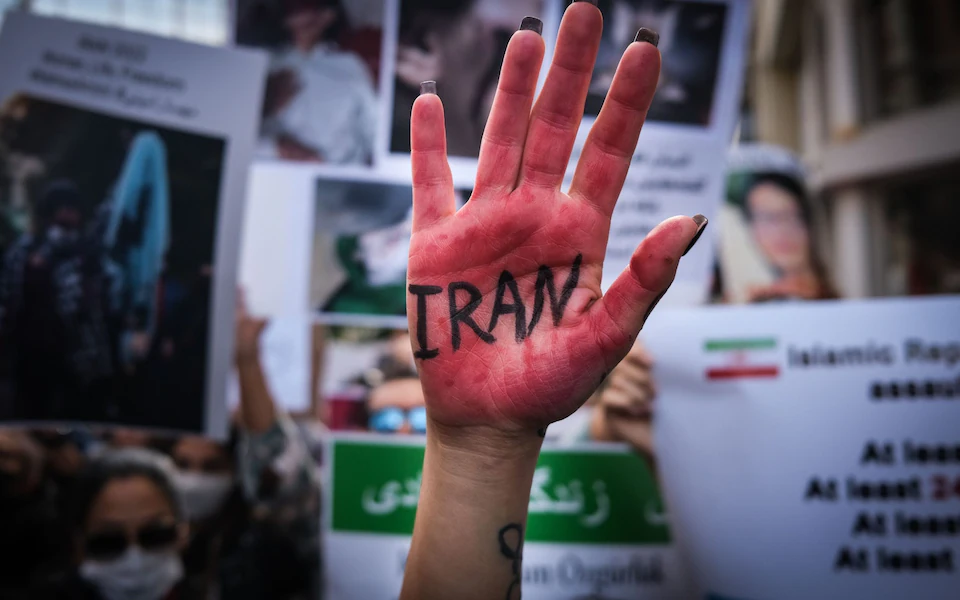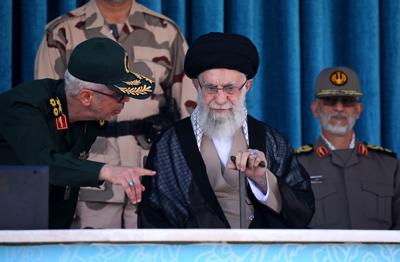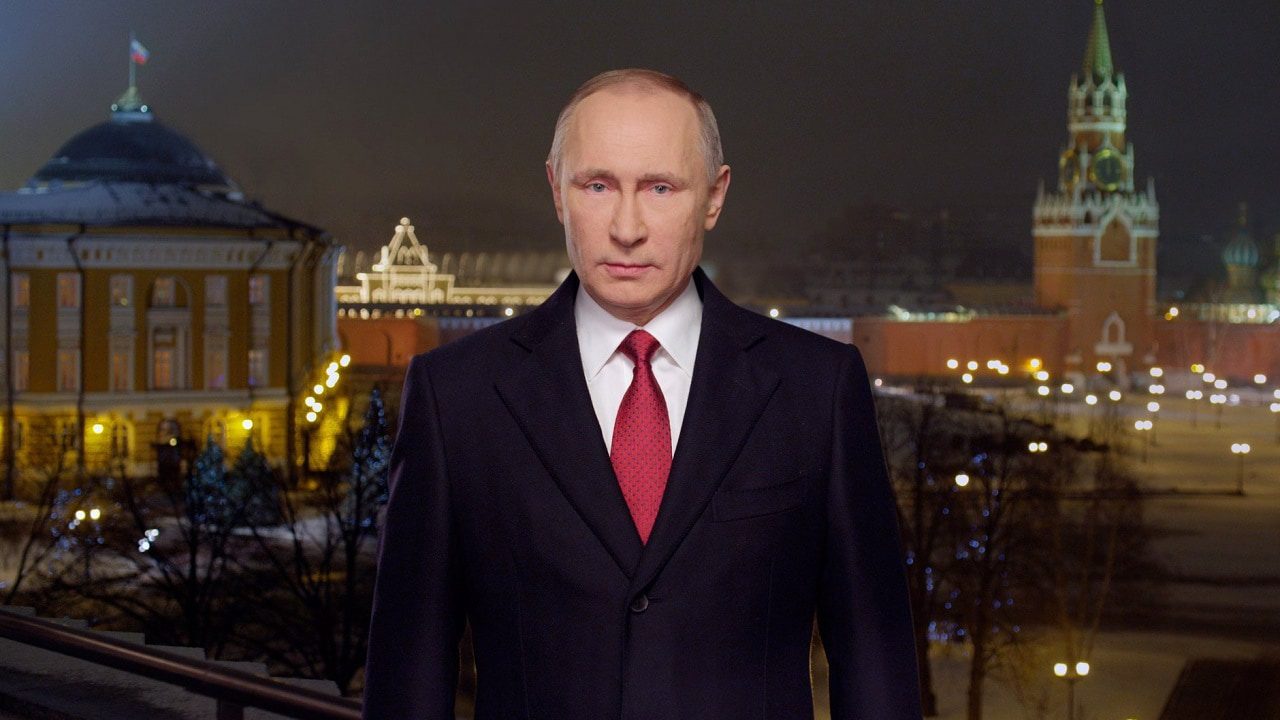By Dr. David Wurmser
At the time of this writing, the Iranian people are rising up across all its communities to free itself from the Islamic Revolution. It is unclear that the regime will survive. This hope, combined with the horror of its amassed brutality over the last 43 years and the complete disregard for international convention, let alone international law, should remove the option of proceeding with any new nuclear agreement with Iran. Instead, the West should finally reach consensus that the current talks must be terminated. The reliability of any treaty – which is after all a contract under the very international law the regime has consistently not only violated but whose validity it has dismissed – is futile. The regime is not a legitimate interlocutor.
Indeed, the very act of negotiating with the regime itself validates and enriches the regime at precisely the time that the Iranian people have rejected its legitimacy and are desperately trying to fight the mechanisms of brutality. An agreement would not only signal that the West assumes the regime’s survival, but it would unlock hundreds of billions of dollars to fund the regime’s repression apparatus internally and its instruments of accelerating aggression externally. In essence it betrays the Iranian people who are trying to free themselves from the deadening hand of this regime.
Moreover, the regime has consistently used international negotiations to make a withering argument against its own people whenever its internal legitimacy was shaken. It has argued that the international community does not care about Iranians and Iranian freedom, but only conspires perpetually to weaken the “great Iranian nation.” The symbol of such greatness, they argue, is Iranian nuclear power. As such, the regime argues, the West is supporting Iranian popular attempts at liberation only as leverage to suppress the power of the Iranian nation and deny its historical greatness, and that the West will abandon the Iranian people the moment the leverage is spent or worthless. To this end, it points to the statement by the Obama administration in 2009 during the height of the “Green” revolution that it tempers its support for the demonstrators because it has “other priorities as well,” clearly implying the nuclear talks.
Beyond these valid and overarching considerations, the obsession with continuing talks with Iran over its nuclear program rests on a key assumption: that in the end, Iran does not want nuclear weapons – indeed, feels religiously opposed to such weapons — but only seeks them for a sense of security or a form of leverage on other matters. One of the most important documents to which western diplomats consistently refer that bears this assumption out is the Fatwa issued by Ayatollah Khamenei in 1997 which specifically prohibits nuclear weapons as un-Islamic. Between 1997 and 2012, this Fatwa became a backstop of confidence for diplomats who began conceding verifiable and solid restrictions on Iran’s nuclear activities in exchange for a sweatheart nuclear “cutout” deal with Iran that erases lingering past concerns and gives it rights and privileges within the International Atomic Energy Agency (IAEA) far beyond any other P-5 nation (US, UK, Russia, France and China) within the Nuclear Non-Proliferation Treaty (NPT).
The fatwa stood at the center of US debate in the several years leading up to the signing of the Joint Comprehensive Plan of Action (JCPOA, a.k.a. the 2015 “Iran nuclear deal”). Despite the fact that there has never been a text issued of this Fatwa in public – and thus we do not know with any certainty what it purports to say, its has been the subject of academic and international policy journals analyses. The Iranian regime encouraged highlighting the solidity and importance of this fatwa, suggesting in its propaganda “academic” journals that it was an even more solid guarantee than the NPT itself. For example, a Kent University Ph.D., Farhad Sirjani, wrote with the veneer of scholarly garb in 2013:
The Fatwa elaborates and confirms Iran’s commitment regarding WMD ban, on the one hand, and Iran’s insistence on its NPT right to peaceful uses of nuclear technology, on the other. It is concluded that the commitment undertaken by Iran via the Fatwa, is, in some important respects, more comprehensive and more long-lasting than that Iran has undertaken under the NPT. 1
This fatwa influenced not only the public debate, but policymaking not only at the level of diplomats, but at the presidential level itself under the Obama administration. For example, on September 24, 2013, at the UN General Assembly’s annual opening in New York, President Obama in his speech said:
“Meanwhile, the Supreme Leader has issued a fatwa against the development of nuclear weapons, and President Rouhani has just recently reiterated that the Islamic Republic will never develop a nuclear weapon. So these statements made by our respective governments should offer the basis for a meaningful agreement.”2
The appeal to this fatwa has once again appeared recently in US government briefings and statements as the United States continues to seek a new nuclear agreement with Iran. Indeed, so much is it understood by Iran that this fatwa remains a core pillar of the assumptions governing western policy that the Iranian regime employed the threat of rescinding it – strongly suggesting it believed such a threat forms effective pressure on the US government. As Iranian lawmaker, Sabbaghian Bafghi, said on August 2, 2022:
“We will ask Supreme Leader Ali Khamenei to change his fatwa and strategy on the prohibition of producing nuclear weapons if the enemies of the Islamic Republic continue their threats.”3
The problem is that this Fatwa has never been published, nor likely has it ever existed. The core assumption and evidence to which western diplomats cling to allay their fears of Iran’s ultimate intentions for the acquisition and use of a nuclear weapon, in fact, does not exist. It never did.
As such, it is important to go back to the evolution of this myth to its origins in the 2008-2012 period to ferret out that western belief in the critical assumption is, in fact, flawed.
KHAMENEI’S FATWA AGAINST NUCLEAR WEAPONS
As the negotiations between the P5+1 (the UN Security Council’s five permanent members plus Germany) talks with Iran in Istanbul began in mid-April 2012, the proceedings and public discourse were both seized with reporting of the issuance (or supposed issuance) of a fatwa, or a religious ruling, by Ali Khamenei, the supreme religious authority in Iran’s current revolutionary regime. The fatwa, Iran’s press reported, forbids the production, stockpiling and use of nuclear weapons – what it called “the three “nos.”
Iranian officials noisily heralded the fatwa as proof that Iran was not trying to weaponize its nuclear program, and was thus operating within its nuclear rights under the Nuclear Non-Proliferation Treaty:
“The fatwa that the Supreme Leader has issued is the best guarantee that Iran will never seek to produce nuclear weapons, Judiciary Chief Ayatollah Sadeq Amoli Larijani said on Wednesday [11 April] … Khamenei has issued a fatwa declaring that production, stockpiling, and use of nuclear weapons are all haram (prohibited in Islam).”4
Iran’s Foreign Minister Ali Akbar Salehi highlighted this as a turning point in the negotiations, saying that the West realized that Khamenei’s fatwa against making atomic bombs “had a religious basis and was announced on the basis of Shari’ah tenets and not for political purposes. Taking this into consideration, the West came to the conclusion at the Istanbul talks that a joint framework was needed as a basis for advancing the talks with Iran.”5
In recent weeks, the West has led an effort to tighten the screws on Iran through toughened sanctions with the hope of compelling Tehran to accept a restraint on its nuclear program, the first test of which were the Istanbul talks. While it may not be the official US negotiating stance yet, the United States has recently defined its red line in public signaling not around the state of progress of Iran’s program, but whether Iran would cross the threshold of weaponization. As such, Western diplomats were quick to note that such a fatwa could be an important benchmark that suggests the current effort of isolating and pressing the Iranian regime is beginning to show signs of success. As the London Telegraph reported, “[Secretary] Clinton revealed that she has been studying Khamenei’s fatwa, saying that she has discussed it with religious scholars, other experts and with Turkish Prime Minister Recep Tayyip Erdogan. ‘If it is indeed a statement of principle, of values, then it is a starting point for being operationalized,’ Clinton said.”6 Europeans were even more encouraged: “One of the diplomats, who demanded anonymity because he was sharing information from a closed session, said the Iranians appeared to be moving toward that goal [of discussing their program], engaging in discussion about the peaceful use of nuclear energy and the Nuclear Nonproliferation Treaty. He said the Iranian team had mentioned supreme leader Ayatollah Ali Khamenei’s ‘fatwa,’ or prohibition, of nuclear weapons for Iran, in the course of the plenary discussions” which European Union foreign policy chief, Catherine Ashton described as “the beginnings of a sustained process.”7
RECURRING REPORTS OF THE FATWA
The saga of this heralded fatwa is neither new, nor is it tied to the current state of pressure under which the Iranian regime finds itself. It dates as far back as 1997, and has been reported before – indeed several times – in the Iranian press or referred to in statements by Iranian officials:
In an interview in the German paper, Der Spiegel, in early December 2011, Iran’s foreign minister, Ali Akbar Salehi added: “Iranian supreme leader Ayatollah Ali Khamenei has issued a fatwa saying that nuclear weapons are not acceptable in Islam and that they are banned in Islam. This means that the mass destruction weapons play no role in our defense strategy.”8
In an interview on November 19, 2011 with the Italian paper, Corriere Della Sera, Iranian ambassador to Rome, Seyed Mohammad Ali Hossaini, said: “Iran has always aimed for a peaceful, civilian use of nuclear energy, we stated that right at the start of our program. Our highest authorities have always said that they believe the production, storage, and use of nuclear arms is something execrable, or even “haram,” which in Islamic religion is a prohibited action, totally to be condemned and banned. This principle is also contained in a fatwa, a religious precept, issued by Ayatollah Ali Khamenei, who is the highest religious and political authority in the Islamic Republic of Iran. And we immediately issued it worldwide. The importance of this fatwa is such that, even if the international community were to give the green light tomorrow to an Iranian nuclear bomb, our government could not build one.”9
- During a visit to Slovenia on July 11, 2011, Iranian Foreign Minister Ali Akbar Salehi, said that Khamenei issued a fatwa declaring that the production, stockpiling, and use of nuclear weapons are all haram.10
- In September 2004, Iran’s broadcasting authority reported that Khamenei had issued a fatwa – apparently as early as 1997 – stating that the use of nuclear weapons was contrary to and forbidden by Islam, and that this fatwa had been mentioned by Iran’s nuclear negotiator and National Security Council head, Hassan Rouhani, during the talks with the West.11
- The Islamic republic issued an official statement at the emergency meeting of the International Atomic Energy Agency (IAEA) in Vienna on Aug. 9, 2005, which was reported through a website, saying: “The Leader of the Islamic Republic of Iran, Ayatollah Ali Khamenei has issued the fatwa that the production, stockpiling and use of nuclear weapons are forbidden under Islam and that the Islamic Republic of Iran shall never acquire these weapons. President Mahmoud Ahmadinejad, who took office just recently, in his inaugural address reiterated that his government is against weapons of mass destruction and will only pursue nuclear activities in the peaceful domain.”12
But is taking weaponization off the table by Iran really the bottom line issued by the highest religious authority in the land?
TOLERANCE OF STATEMENTS CONTRADICTING THE FATWA
Fatwas are serious affairs within a community of believers, and even more so among Shiites who break themselves down into schools of followers headed by one of several religious scholars who have attained the highest form of learning and are worthy of emulation (Marjah al-Taqlids). In Iran’s Islamic Republic, this reaches even greater heights, with the reigning theological premise being that of the Valiyet e-Faqih (Rule of the Jurisprudent) – a concept rejected by most Shiites outside of Iran – in which a ruler is anointed to assume the voice and authority of the occulted 12th Imam in the absence of his return. He is superior to any of the other sources of emulation and assumes the role of supreme ruler with accompanying religious authority.
As such, it is all the more surprising that ever since 1997 when the original fatwa by Khamenei was ostensibly released, a good number of Iranian leaders have issued fatwas or made statements which seem to directly contradict the religious edict of the unassailable and infallible supreme leader. These fatwas either suggest Iran is contemplating a nuclear weapons strategy, or outright call for Iran to develop, or even use, nuclear weapons:
- In 2005, Ayatollah Mohammad Taqi Mesbah Yazdi published a book titled, The Islamic Revolution – Surges in Political Changes in History. Apparently the publisher, the Center of Publications of the Imam Khomeini Research Institute, released only 3000 copies limited to the seminary in which he taught. On page 337 of his book, clearly referring to nuclear weapons, he wrote: “We have to produce the most advanced weapon inside the country, even if our enemies do not like it. There is no reason that they have the right to produce a certain special type of weapon, but that other nations do not.”13
Mesbah Yazdi is not only a member of the Council of Experts – the body which chooses the Supreme Leader – but also the founder of the Haqqani school in Qom which trains future cadres of the regime whose alumni form the backbone of the clerical management class that runs Iran’s key political and security institutions. Mesbah Yazdi is one of the most prominent religious figures in Iran and is considered the mentor of President Ahmadinejad and leader of the Mahdist school (those who believe they see the signs aligning that confirm the 12th Imam is on the verge of returning from occultation).
- On February 16, 2006, the reformist internet daily, Rooz reported that the late Mohsen Gharavian – a lecturer at the Qom seminaries and a prominent disciple of Mesbah Yazdi, issued a fatwa which read: “One must say that when the entire world is armed with nuclear weapons, it is only natural that, as a counter-measure, it is necessary to be able to use these weapons. However, what is important is what goal they may be used for … According to Shari’ah, too, only the goal is important….”14
- On April 24, 2011, the website of Iran’s Revolutionary Guard Corps (IRGC), Gerdab, published what it envisions the day after Iran’s first nuclear test: “The day after Iran’s first nuclear test will be an ordinary day for us Iranians, but many of us will have a new gleam in our eyes – a gleam of national pride and might.” The article then continued by citing the Koran’s chapter 8, verse 60: “And prepare against them what force you can, and horses tied at the frontier, to frighten thereby the enemy of Allah and your enemy.”15 In tying this Koranic phrase directly to the quest for nuclear weapons, the IRGC publication in essence defines nuclear weapons as a requirement of the Islamic Republic’s constitution, since Article 151 of Iran’s Constitution relies on the authority of that very passage of the Quran when it states: “Prepare against them whatever force you are able to muster, and horses ready for battle, striking fear into God’s enemy and your enemy.”
One might be tempted to discount these statements, since they are from officials who could be seen as part of the competing faction to the Supreme Leader. But other officials, who owe their allegiance and careers to Khamenei’s sufferance (and thus cannot be considered to be from a “deviant” or competing faction), also have expressed a quest for weaponization:
- On December 14, 2001, during the al-Quds (Jerusalem) day sermon, Iran’s former president, Ali Akhbar Hashemi Rafsanjani declared at the University of Tehran not only that Israel can be destroyed with a single bomb, but suggested that Israel’s likely nuclear retaliation is digestible because the Muslim world would only be damaged by it: “If one day … the world of Islam comes to possess the weapons currently in Israel’s possession [nuclear weapons] – on that day this method of global arrogance would come to a dead end. This … is because the use of one nuclear bomb in Israel would leave nothing on the ground, whereas it will only damage the world of Islam.”16 He added that “It is not irrational to contemplate such an eventuality.”17
- On August 22, 2006, at the ceremony in Arak in which Iran inaugurated its heavy water plant, the Deputy Speaker of the Majlis (parliament), Mohammed Reza Bahonar, declared: “The Iranian people is faced by unreasonable forces that possess nuclear weapons, and there is no [force] that can deter them. If they put pressure [on Iran], the [Iranian] people may ask the government to produce nuclear weapons for the sake of deterrence … You [the West] need to fear the day the Iranian people will amass in the streets, demonstrate and ask of its government to produce nuclear weapons in order to counter the threats…”18 Far from paying a price for this statement, Bahonar, who is also the Leader of the Islamic Society of Engineers, was reelected and served in the post until 2011.
- An Iranian paper, Asr-e Iran, published an editorial on February 28, 2010, saying: “The truth is that for Israel … the mere sense of insecurity is deadly poison…The truth is that Israel knows very well that even if Iran obtains nuclear weapons, it will never use them except in self-defense… Rather, Iran’s possession of such weapons will sow in Israel a sense of insecurity – and this sense alone will be enough to shatter the glass palace of this illegitimate regime in the Middle East. An Iran with nuclear weapons means an end to the dream of ‘secure Israel’ – and this means the exodus of most of the residents of this occupied land… This exodus will include human, financial, and other capital, and, therefore, will be a death sentence for this regime.”19
These articles by both allies and competitors to Khamenei have never elicited a price or even a reprimand for having so blatantly crossed the Supreme Leader and his fatwa.
THE FATWA CONTRADICTS OTHER FATWAS
The effort to gauge the meaning and validity of this supposed fatwa is also problematic since no reasoning or context is provided in the reports or statements discussing why such a weapon is, from a religious point of view, materially different from any other weapon, and why it should be thus forbidden (haram) rather than encouraged to fulfill – as the IRGC’s publication, Gerdab suggests – the stipulation outlined in Koranic verse 8:60 and mentioned in Article 151 of the Constitution.
In the West, we accord not only nuclear weapons, but an entire category of weaponry, a special status defined by the term “weapons of mass destruction,” namely their ability to inflict mass death and realistically contemplate swift, genocidal annihilation. In Iran, however, mass destruction has been sanctioned as part of a sanctioned cult of annihilation and martyrdom. The Iranian regime has issued numerous fatwas which provide the religious justification for not only the permissibility, but the imperative of inflicting mass killing of the enemy, and the acceptance of severe retaliation as a religiously justified risk and cost.20 This is true not only of the competing clerical leaderships surrounding Khamenei and Ahmadinejad – but even the “moderate” camp defined by the likes of Rafsanjani.
Given the context of other fatwas’ legitimizing a cult of annihilation and martyrdom, it is impossible that this fatwa grounds its special treatment and prohibition of the nuclear weapon in the ghastly nature of the weapon, as we do in the West. And in every mention of the fatwa, only the one sentence appears and there is no discussion, nor any stated reason – as there often are in fatwas in Shi’ism, which generally list both the verdict and the arguments that led to it – why nuclear weapons alone are singled out for prohibition and inapplicable to the Koran’s chapter 8, verse 60 and Iran’s Constitution’s article 151, both of which command Muslims to “muster whatever force you are able” to fight the enemy.
Other aspects of Iranian rhetoric are also inconsistent with the heralded fatwa. Specifically, Iran suggests rather bluntly how analogous its current situation is to North Korea’s as Pyongyang moved toward weaponization, implying Tehran reserves the right to pursue the path the fatwa forbids.
Khamenei’s mouthpiece Keyhan drew the most direct analogy on October 13, 2006 in an editorial entitled: “Lessons from North Korea:”
“What led Korea to this point was nothing but persistence in the face of the U.S., which would not agree to … assure it that it would not act to topple the North Korean government .… The Koreans said many times before that if America would stop its operations to topple their government … then North Korea would have no problem whatsoever with the inspection of their efforts to produce nuclear weapons. But the Americans, with their usual defective mindset … persisted and now it’s over… North Korea has built a nuclear bomb before America’s eyes, despite the great pressure it was under, and despite years of harsh international sanctions – and no one has managed to do anything against it … What this means is that if any country, such as North Korea, concludes for political or security reasons that it must have nuclear weapons, it will ultimately succeed in implementing its wish – even if the whole world does not want it to.”21
Iran’s chief nuclear negotiator of last decade, Ali Larijani – who is now the Speaker of Iran’s parliament – made the connection directly:
“You have pressured North Korea for two years and consequently it withdrew from the NPT and IAEA…I recommend that you once again pay attention to the conduct of North Korea. After two years … you have accepted North Korea’s nuclear technology… So accept ours now… [A]lthough Iran proposes these peaceful conditions, if you want to use aggressive language, Iran will have no choice but to protect its technological accomplishments by withdrawing from the NPT.”22
In short, in the view of the Iranian leadership surrounding Khamenei, the United States’ refusal to meet the DPRK’s demands fully not only justified, but left Pyongyang no other choice but to realize its nuclear quest and seek a weapon. Iran’s leaders argue that Iran now finds itself along the same path, implying that if their demands are not met, they too would not only be justified, but impelled, to seek the very nuclear weapons the reported fatwa ruled are forbidden.
THE HIDDEN FATWA
Taken together, it is nearly impossible to reconcile Khamenei’s reported fatwa prohibiting nuclear weapons with the gist of Iranian public statements since the first references to it were made in 1997 – all of which flow in the opposite direction.
Moreover, the problem is compounded by the fact that that Khamenei’s fatwa has never been seen or published – not in 1997, 2005, 2011, or today. The Iranian press referred to it, and Iran’s negotiators at various P5+1 talks have regularly raised the existence of this fatwa as proof of Iran’s good intentions, but Khamenei has never said or released it in public. It is impossible to properly analyze, or understand the context in which it needs to be understood and followed, or if it even exists.
Either the fatwa outright is a fabrication for the purposes of willful deception of the West or that the operative phrase is embedded in the context of a larger fatwa which makes the prohibition on these weapons – and perhaps others as well – conditional on theoretical circumstances such as, for example, the age in which Islam has universally triumphed and, the Mahdi has returned. Indeed, were the operational phrase in the fatwa so conditioned, then it would have been perfectly consistent and reinforcing for Mohsen Gharavian to have issued his fatwa on Iran’s right to nuclear first use in 2006. And this would explain why there never was any criticism, let alone sanction taken, by any journalist, institution or official connected with Khamenei or the government against Gharavian or any of the others who suggested Iran has a nuclear armaments concept or should have or use a nuclear weapon.
CONCLUSION: CONTRADICTING FATWAS REVEAL TACTICAL FISSURES IN THE REGIME
As if the drama surrounding its sudden appearance on the scene without accompanying evidence, not least of which is the absence of any publication to date of any official text of this fatwa, makes this entire episode deeply suspicious. The only evidence that we have that such a fatwa exists is that official statements from Iran say it is so, but they too fail to provide any text. Mohsen Rafighdoost, a minister in the IRGC responsible for a significant part of the nuclear program, said in 2014 he sought to pursue a nuclear weapons option, but was restrained by the ostensible edit – which led quickly to established Western journals, such as Foreign Policy, to seize on the statement as definitive evidence of the edict.23 Of course, it is unclear why the IRGC even had a role in the nuclear program if it was not for military purposes.
In short, there is no evidence that this fatwa exists beyond dubious statements from officials saying it does. Moreover, assuming the phantom edict does exist, nobody knows what it actually says since its content has never been published. Whole articles have been written by Iranian propagandists about it and analyzing its importance without ever citing even a single phrase or line from the edict.
In contrast, there is evidence from other, published and clearly existing fatwas that the Iranian regime does consider nuclear weapons as legitimate. And in the last years, there have been several Iranian officials, such as Abolfazl Razavi Ardakani, who have said it was either temporary and in effect – surprise, surprise — only until the most recent period in which Iran actually reached the technical ability to approach a nuclear device.
Our Leader’s fatwa that Iran would not pursue an atomic weapon was meant for its time. It is possible that the Leader will change his mind. This is based on the Islamic ruling about whether it is allowed to put stones in the enemy’s river in order to poison him. The answer is that this is allowed if it’s the only way to prevail…. It is possible that the Leader will give the order to enrich uranium to 90%. The Leader knows perfectly well when to give which fatwa. The fatwas of the religious scholars, especially secondary ones, are not permanent. There is a difference between primary fatwas and secondary fatwas. A jurisprudent can issue a ruling and then cancel it 10 years later.”24
And finally, there are even official statements that suggest that the fatwa never existed. Former Iranian member of the Majlis (parliament), Ali Motahari, said on April 24, 2022 that:
“From the very beginning, when we entered the nuclear activity, our goal was to build a bomb and strengthen the deterrent forces, but we could not maintain the secrecy of this issue, and the secret reports were revealed by a group of hypocrites.”25
On balance then, the evidence is substantial the entire tale of Khamenei’s phantom nuclear fatwa is little more than an attempt at strategic deception. Either the fatwa does not exist or exists within a hidden context, the obvious failure of enforced discipline of message, and the absence of any reprimand is likely a result of fissures within Iran’s regime.
However, since even allies of Khamenei were on record before 2006 suggesting a nuclear weapons quest, the fissures cannot be understood through categories such as “hardliners” or “moderates” over nuclear policy, but a schism between two schools of thought, reflected most starkly by Khamenei on the one hand, and Mesbah Yazdi on the other. Most of the post-2006 statements overtly suggesting a nuclear weapons quest appear to come from the clerics surrounding Ayatollah Mesbah Yazdi, while those reinforcing the ostensible fatwa came from the traditional clerical elite aligned with Khamenei and his close associate, Ali Larijani.
While the disagreement plays itself out over the fatwa issue, it is not about the legitimacy of nuclear weapons at all, but about a disagreement over whether Iran should pursue Taqqiyah (deception) and caution against the West because open confrontation could be dangerous, or whether Iran should flaunt its ambitions since the West is toothless and overt confrontation would only expose that weakness.
Khamenei represents the clerical establishment, who views the preservation of the revolutionary regime and its mundane moorings as the prime directive. While not moderating or compromising, Khamenei and those close to him have consistently chosen to maneuver and be indirect rather than have a confrontation with the West.
In contrast, Ayatollah Mesbah Yazdi rejects maneuvering and indirect confrontation as too cautious, and even heretical against the will of Allah. Instead, he and his followers believe the hidden 12th Imam is near his return, and that divine intervention – secured by rigid adherence to principle – is the true source of victory for the Islamic Republic. For example, in his book which discussed the need to pursue the “special” (read nuclear) weapon, Yazdi wrote:
“In seeking to acquire the technology, Iran must be patient and not be deterred by economic shortages. Divine, messianic support has been the determining factor of the Iranian regime during the various trying periods which have plagued it since its foundation.”26
In late 2007, Khamenei’s ally, Ali Larijani, who hails from one of the grand, traditional clerical families (the Amelis) of Qom, was forced by Ahmadinejad to resign as the head of the Supreme Council for National Security. His replacement, Saeed Jalili is guided by Mesbah Yazdi. In his first major speech published four days after assuming his new position on October 21, 2007, Jalili attacked previous governments for having “strayed from the principles derived from Islamic revolutionary teachings.” In contrast, Jalili argued that under Ahmadinejad, Iran’s foreign policy has returned to its ideological base and is “avoiding the past experience of sacrificing principles when faced with a challenge…Principles should not be sacrificed … in the name of pragmatism.”27 Jalili even went on to suggest previous policies demonstrated “cartoon-like behavior [which causes] 180-degree turns in foreign policy without any basis.” Jalili then echoes Mesbah Yazdi’s eschatological spin: foreign policy should be coupled “with reliance on divine assistance” and should be based on a theological model which will bring “a good ending in this and the next world as was the intention of the Islamic revolution.” Referring to the previous governments’ suspensions of Iran’s nuclear program to avoid international reactions, Jalili “steadfastly stressed” the need to “return to an ideological and principled approach” in order to shape the nature of Iranian foreign policy in accordance with Islamic “authenticity based on the Prophet’s diplomatic strategy.” He went on to suggest that “pragmatism” should be seen as willful disobedience to the divine Will.”28
In short, the inconsistency surrounding Iranian governmental statements and the fabrication or selective reporting on Khamenei’s fatwa on the nuclear issue tells us almost nothing about the regime’s theological view of the legitimacy of pursuing nuclear weapons, but it does expose the nature and theological foundations of the fissures within the regime.
